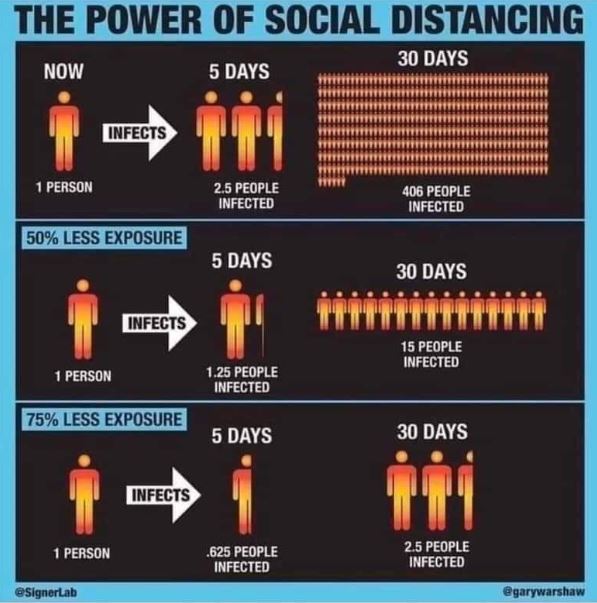|
Dear Friends and Neighbors,
For those of us following the developments around
COVID-19 in Wisconsin, it can be hard to keep up with
the rapidly changing news. While the response to
Coronavirus continues to impact our daily lives,
Wisconsinites have come together to work on slowing the
spread of this highly-contagious and serious virus which
should help us get back to our normal lives sooner. For
this, we should all be proud.
To update some of the information from last week’s
Updates from the State Senate e-newsletter and provide
details on new developments, I’ve collected more
information on the state’s response to the COVID-19
outbreak and have included it below. But again, before I
discuss some of these updates, I want to first encourage
you to visit
this
state website which provides more information on
each state agency’s role in this outbreak.
SAFER-AT-HOME ORDER
Earlier today, Governor Evers
announced his intention to issue a ‘Safer-at-Home’
order tomorrow. While we await details on what the order
will entail, I’d encourage you to continue following the
news and my social media pages to see the latest details
in these rapidly changing times.
Prevention
I’m sure you’ve heard this enough recently, but
according to state and federal health officials, actions
you can easily work into your daily routine will help to
prevent the spread of Coronavirus. These practices
should be used even by people who don’t have any signs
of illness as you may be a carrier of the virus but be
asymptomatic, or you may be exposed to the illness while
at a grocery store or pharmacy.
-
Wash your hands often with soap and water for at
least 20 seconds, and use hand sanitizer between
hand washings
-
Avoid close contact with others, even if they’re not
currently ill (known as ‘social distancing’)
-
Avoid touching your eyes, nose, and mouth
-
Stay home, especially if you’re sick or if you may
have a compromised immune system
-
Cover your cough or sneeze with a tissue, then throw
the tissue in the trash and wash your hands
-
Clean and disinfect frequently handled objects and
touched surfaces (such as cell phones)
-
Follow CDC’s recommendations for using a face mask,
meaning you should only use one under limited
circumstances unless you’re a health care
professional to avoid scarcity
To understand the importance of social distancing,
check-out this graphic:

Tracking
As of this morning, there were a total of 416 positive
tests and over 7,000 negative results from those tested
who did not have Coronavirus in Wisconsin. Regrettably,
there have also been four fatalities as a result of
COVID-19. As numbers continue to rise, keep in mind that
increased testing will lead to a better, more complete
picture of the scope of this problem in Wisconsin.
That’s why self-isolation and social distancing
techniques for everyone, not just those who have tested
positive for Coronavirus, is so important.
So far, five positive tests have been reported in
counties in the 2nd Senate District. Outagamie County
has had two positive tests, and Brown County has had
three positive tests. Public health officials have also
noted that Brown County has seen evidence of community
transmission where a person who’s tested positive for
COVID-19 has contracted the virus from an unknown source
instead of by traveling to an affected area or knowingly
being exposed to someone who tested positive. To date,
Shawano and Waupaca Counties still do not have any
positive tests.
To see the most up-to-date Coronavirus numbers compiled
by the State Department of Health Services, visit
their website.
Schools and Universities
K-12 schools closed as a result of the COVID-19 outbreak
have no definitive opening date at this point. But
actions this weekend by the Administration will help to
alleviate some of that uncertainty faced by school
districts. A
new Executive Order helps to ensure the Department
of Public Instruction (DPI) can streamline the waiver
process for schools to reduce their hours of instruction
requirements. The Order also provides DPI with some
flexibility in upcoming due dates for school
requirements, and suspends student teaching hour
requirements to ensure those future educators can
graduate on time.
The University of Wisconsin-System has also taken
proactive steps to ensure students have some clarity and
certainty moving ahead. For students who used campus
housing, those campuses will be refunding 100% of the
prorated charges for housing and dining for the balance
of the spring semester.
This comes as many campuses have chosen to proactively
announce that they do not anticipate holding in-person
classes for the reminder of the spring semester.
Further, campuses, including UW-Green Bay, are not going
to be holding in-person graduation ceremonies in May.
UW-Green Bay and other campuses are looking for
alternative ways, including virtual experiences, to mark
the tremendous achievement of graduation for those
students.
As a reminder from last week, whether you’re a college
student now at home or if you’re a parent with a child
now at home, you may be eligible for 60 days of free
broadband and Wi-Fi access from Charter to ensure you
don’t miss out on any online instruction. Learn more
about this officer from Charter on
their website.
Unemployment
Wisconsin employers are facing difficult decisions as
business slows or halts during this public health
emergency, and for workers, this unfortunately may led
to joblessness. Last week, executive action made it
easier for workers to receive unemployment benefits from
the Unemployment Insurance program, including waiving
work search requirements during the benefits period.
If you’ve been laid off or are concerned about
unemployment as a result of the COVID-19 outbreak,
please review these frequently asked questions on the
Department of Workforce Development’s website and
apply for benefits
here.
Additionally, while many employers have had to make
difficult choices with their employees in some
industries, other industries, primarily grocery store
and big box retailers, are faced with difficulties in
finding new, temporary workers to fill extra needs
during this busy period. To find one of these jobs,
search the
Job Center of Wisconsin’s website.
Assistance for Small Businesses
Small businesses suffering losses from the outbreak of
COVID-19 have been faced with difficult decisions in the
past few weeks. The decisions on the closing and opening
of businesses is at the discretion of public health
officials at the local level and the state Department of
Health Services, who are often following the direction
of similar experts at the federal Centers for Disease
Control and other federal agencies.
While these losses are hard to grapple with, I’ve been
pleased to see steps towards relief offered by the state
Wisconsin Economic Development Corporation and the
Wisconsin District Office of the federal Small Business
Administration. These entities have worked to make grant
and loan programs available to small businesses during
these trying times.
First, the Wisconsin Economic Development Corporation
has developed the Small Business 20/20 grant program in
reaction to this outbreak. Through this program,
entities that have relationships with
Community Development Financial Institutions (CDFI)
and have less than 20 full or part-time employees may be
eligible to apply for grants of up to $20,000, with the
program totaling $5 million, for assistance with payroll
and rent expenses.
Also, just approved on Friday night, small businesses in
Wisconsin will be eligible for Economic Injury Disaster
Loans through the Small Business Administration. These
loans are available for up to $2 million and may be used
to meet the needs of payroll, accounts payable, and
fixed debt payments until the outbreak subsides. The
interest rates on these loans are competitive at 3.75%
for small businesses and 2.75% for non-profits.
Both programs are outlined, along with links for details
on applying for these programs, on the Wisconsin
Economic Development Corporation’s
webpage dedicated to Coronavirus. Additionally, if
you’re interested in a small business disaster loan, I
would further encourage you to
review this fact sheet on the loans from the Small
Business Administration. Further information on applying
to this program may be found
here, and details on finding a regional office for
assistance in filling out an application is available
here.
Early Voting
The spring election on April 7th is still planned as
scheduled based on the direction of the Governor.
Registering to vote ahead of the election and voting by
mail or voting in-person but early are important steps
to reduce the spread of COVID-19 and ensure you and your
fellow voters can be protected during this election
cycle. As Wisconsinites partake in our democratic
process, the Wisconsin Elections Commission has provided
the following guidance:
-
You must be registered to vote to request an
absentee ballot.
-
The deadline to register by mail to vote has passed.
-
The deadline to register online to vote has been
extended by federal court order until March 30.
-
The WEC is working to reinstate online registration
in the next few days.
-
Voters who need to register may also do so in person
at their municipal clerk's office until the Friday
before the election and on Election Day at the
polling place, pending details in the stay-at-home
order.
-
Voters should request an absentee ballot as soon as
possible for April 7. The deadline is April 2, but
do not wait!
-
Request your absentee ballot online at the
MyVote
Wisconsin website.
Price Gouging and Consumer Protection
Price gouging, or raising the price of a product during
a time of scarcity, is illegal during a statewide
emergency. The Attorney General and Department of
Agriculture, Trade and Consumer Protection (DATCP) are
encouraging citizens to report suspected price gouging,
false marketing claims, fraud, scams, and other consumer
complaints related to Coronavirus. To report a
complaint, please contact DATCP’s Consumer Protection
Hotline at (800) 422-7128 or
DATCPHotline@wisconsin.gov, or file an
online complaint.
Additionally, learn more about DATCP’s response to
COVID-19, including with their oversight of campgrounds
and the state’s fuel supply, on
their website.
Department of Motor Vehicles
The Wisconsin Department of Motor Vehicles (DMV) closed
last Friday to clean all of their facilities and are
reopening today for certain services, but are limiting
their functions during this public health emergency.
Foremost, the DMV is implementing temporary changes to
some services to driver services. This includes:
-
An automatic 60-day extension to expiring driver
licenses and commercial driver licenses, including
the waiving of late fees;
-
Cancelling driver skills tests, and;
-
Administrative suspension hearings being offered by
phone and forms, not in person.
To continue using in-person DMV services, they recommend
you schedule an appointment at
this link. Those
without an appointment may be served, but restrictions
on the number of people allowed in DMV offices will be
restricted per state guidelines. In-person customer
service is limited to:
It’s unclear if all DMV activity will be stopped upon
the issuance of the ‘safer-at-home’ order. Learn more
about these DMV changes
here. Questions about DMV services can also be
answered by customer service representatives at the
Driver Services hotline at (608) 264-7447.
For commercial truck drivers, the state Department of
Transportation (DOT) has issued COVID-19 Relief Effort
Supply Permits to allow for additional goods to be
efficiently transported over most Interstates, State
Highways, and local roads. These temporary DOT actions
allow for easier access, including fees being waived,
for overweight permits and exemptions from hours of
service limitations for truckers hauling supplies for
grocery retailers. Learn more
here.
Conservation Congress Moved Online
Measures to reduce the spread of COVID-19 have required
changes to the annual Conservation Congress meeting. A
Wisconsin tradition, each April thousands of engaged
citizens look forward to attending one of 72
Conservation Congress hearings around the state to vote
on advisory questions related to natural resources
management and sporting heritage. As of the drafting of
this e-newsletter, this year, instead of in-person
hearings on April 13th, citizens will be able to provide
input online over the course of a 72-hour period
starting on the 13th. To learn more about online
participation and to find the most up-to-date
information on these changes, please visit the
Department of
Natural Resources’ website.
Tax Filing Deadline Extended
For those of us that haven’t filed our tax return yet,
the federal Internal Revenue Service (IRS) and state
Department of Revenue (DOR) have
extended the tax filing deadline from April 15th to
July 15th as a result of the COVID-19 outbreak. Those
looking to file later than April 15th do not need to
file a request for an extension, and will not face any
fees or penalties from filing later than normal. During
this public health emergency, this is one less thing
that Wisconsin residents will have to worry about.
U.S. Census Door-to-Door Efforts Delayed
The U.S. Census has delayed their door-to-door count
efforts by at least one month until the end of April to
protect their employees and members of the community
that they interact with. However, you are still
encouraged to complete the Census
online or
by mail before the door-to-door efforts begin.
Assistance of the National Guard
At the Governor’s direction, about 300 troops from the
Wisconsin National Guard have been mobilized to state
active duty to assist in the state’s response to
COVID-19. These troops are being used largely for
logistics, including the transportation of supplies
throughout the state such as the 52,000 N95 masks,
130,000 surgical masks, 25,000 face shields, 20,000
surgical gowns, 100 coveralls, and 36,000 pairs of
gloves that Wisconsin received from the Strategic
National Stockpile.
Troops with special medical training are also being
activated to assist in impacted areas, including
at
a Southeast Wisconsin nursing home with an outbreak.
Wisconsin’s Role in this Outbreak
While this outbreak continues, the role of Wisconsin
manufacturers in keeping our country moving is becoming
all the more evident. As noted by a
WPR article, our state’s industry produces
essential, everyday items including toilet paper and
food that often go overlooked until they start becoming
scarcer. This has kicked production into overdrive at
some of these facilities as they look to keep up with
increased demand across our state, the country, and the
world.
Other Wisconsin companies, including
Midwest Prototyping in Blue Mounds, are hard at work
making face shields for health care workers, and many
more are providing essential personal protective gear to
health care workers as they continue facing a shortage
of supplies.
Ways to Help in Your Community
Wisconsin residents have come together to combat the
spread of COVID-19 and are practicing the appropriate
prevention steps to protect yourselves, your family, and
your neighbors. While those prevention steps are the
most important thing to limit the impact of COVID-19 in
our communities and to help us get through the outbreak
sooner, there are other steps you can take to help your
neighbors and community in these trying times.
-
While shopping, make sure you have enough for you
and your family, but also help to make sure the next
shoppers have goods left on the shelves for their
families
-
Check-in on your neighbors, particularly the elderly
or those living alone
-
Offer to assist an elderly or immunocompromised
neighbor with their grocery shopping
-
Order takeout or delivery from a local restaurant
(visit the
Wisconsin Restaurant Association’s website to
find an establishment offering takeout or delivery
near you), but be sure to order early this week
before the issuance of the ‘safer-at-home’ order
-
Purchase a gift card from a local small business to
help them get revenue during this difficult period
-
Donate blood to the Red Cross or other local blood
banks if you’re healthy (for Red Cross blood
donations, call 1-800-RedCross or visit
their
website) and if blood donations are still
allowed under the ‘safer-at-home’ order
-
Thank first responders, nurses and doctors, truck
drivers, grocery store employees, and others helping
our country function during this difficult time
(watch residents of Spain clap for their health care
workers in this powerful video on
YouTube)
Stress Helpline
While it’s important to keep up with the news during a
global pandemic that’s begun hitting closer to home, the
coverage can also cause anxiety, stress, and fear among
Wisconsin residents. If you need to talk to someone
during this difficult time, please reach out to Disaster
Distress Helpline at 1-800-985-5990 or by texting
‘TalkWithUs’ to 66746.
Until Next Time
Despite this outbreak, my staff and I are still here to
assist with questions you may have involving state
government. While we may not always have the answer
right away, we’ll do our best to assist with your
questions and concerns revolving around COVID-19 or
other comments and issues related to state government.
As always, please feel free to
contact my office with any questions or concerns you
may have, and be sure to visit
my website and connect with me on
Facebook,
Twitter, and
Instagram for regular updates on Coronavirus and
more from around the
2nd Senate District and in the State Capitol.
Thanks for reading!

Senator Robert Cowles
Proudly Serving Wisconsin's
2nd Senate District
|

